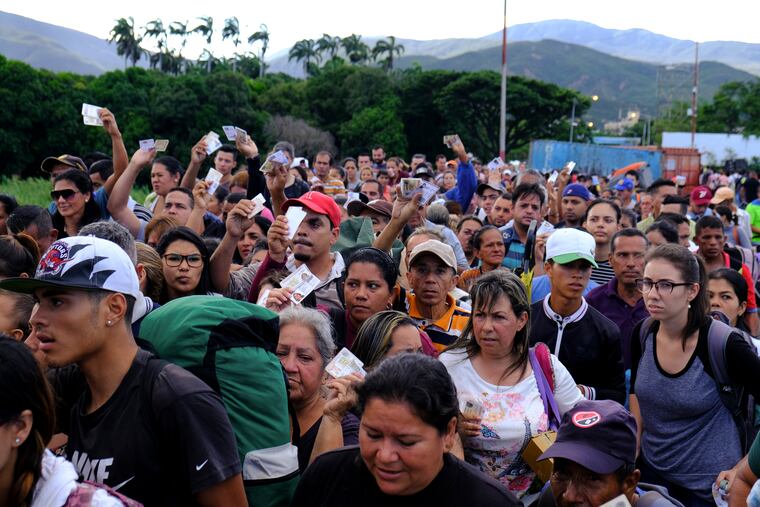Venezuela reopens border crossing with Colombia
Thousands are crossing into Colombia to buy food and medicine after Venezuela's embattled president reopened a border that had been shut for almost four months.

CÚCUTA, Colombia (AP) — Thousands crossed into Colombia on Saturday to buy food and medicine after Venezuela's President Nicolás Maduro reopened a border that had been shut down for the past four months.
Long lines of Venezuelans stood at two international bridges near the city of Cúcuta waiting to have their documents checked by Colombian officials, with some carrying children on their shoulders. Venezuelan border guards dressed in green uniforms helped to control the crowd.
The South American nation's socialist government ordered the borders with Aruba, Bonaire, Curacao, Brazil and Colombia closed in February as the opposition tried to deliver food and medical supplies into the country.
Most of the aid was provided largely by the United States, a key ally of opposition leader Juan Guaidó who declared himself to be Venezuela's rightful president in January. But Maduro dismissed the aid as an infringement on Venezuela's sovereignty and prohibited it from entering.
In May, the government reopened borders with Aruba and Brazil, but the Simon Bolivar International Bridge and the Francisco de Paula Santander International Bridge with Colombia have remained closed up until now.
With the reopening, a flood of people seized on the opportunity to enter into the neighboring country and secure items that are all but unattainable in Venezuela.
The once-wealthy oil nation is now facing severe shortages of basic goods and hyperinflation that is expected to surpass 10 million percent this year, according to a recent IMF estimate. The chaos has been further aggravated by U.S. sanctions on Venezuelan oil exports and has forced an estimated 5,000 people to leave the country each day, according to the United Nation's refugee agency.
On Saturday, UNHCR's special envoy Angelina Jolie was visiting another portion of the Colombia-Venezuela border to learn more about the conditions faced by migrants and refugees and raise awareness about their needs. The Hollywood actress is scheduled to meet with aid workers and Venezuelans and tour a tent village built by the U.N. in the region of La Guajira.
UNHCR said Friday that 4 million Venezuelans, or almost 15% of the population, have left the country to escape its economic and political crisis.
The agency also said the number of Venezuelan refugees and migrants rose by 1 million after November, indicating a rapid escalation as conditions deteriorated and a conflict between the government of Maduro and opposition intensified this year.